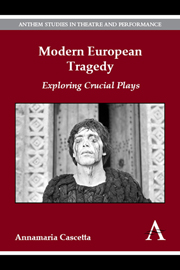Book contents
- Frontmatter
- Dedication
- Contents
- Acknowledgements
- Introduction: The Tragic, Tragedy and the Idea of the Limit
- Chapter 1 Hubris and Guilt: Gengangere (Ghosts)
- Chapter 2 Eve Becomes Mary: L'annonce faite à Marie (The Tidings Brought to Mary)
- Chapter 3 The School of Hatred: Mourning Becomes Electra
- Chapter 4 The Destiny of Man Is Man: Mutter Courage und ihre Kinder (Mother Courage and Her Children)
- Chapter 5 The Tragic and the Absurd: Caligula
- Chapter 6 Dianoetic Laughter in Tragedy: Accepting Finitude: Endgame
- Chapter 7 The Arrogance of Reason and the ‘Disappearance of the Fireflies’: Pilade (Pylades)
- Chapter 8 The Apocalypse of a Civilization: From Akropolis to Apocalypsis cum figuris
- A Provisional Epilogue: Between the Experience and the Representation of the Tragic: Towards a Performative Theatre
- Appendix: Chronology of Productions
- Notes
- Index
Chapter 8 - The Apocalypse of a Civilization: From Akropolis to Apocalypsis cum figuris
Published online by Cambridge University Press: 05 September 2014
- Frontmatter
- Dedication
- Contents
- Acknowledgements
- Introduction: The Tragic, Tragedy and the Idea of the Limit
- Chapter 1 Hubris and Guilt: Gengangere (Ghosts)
- Chapter 2 Eve Becomes Mary: L'annonce faite à Marie (The Tidings Brought to Mary)
- Chapter 3 The School of Hatred: Mourning Becomes Electra
- Chapter 4 The Destiny of Man Is Man: Mutter Courage und ihre Kinder (Mother Courage and Her Children)
- Chapter 5 The Tragic and the Absurd: Caligula
- Chapter 6 Dianoetic Laughter in Tragedy: Accepting Finitude: Endgame
- Chapter 7 The Arrogance of Reason and the ‘Disappearance of the Fireflies’: Pilade (Pylades)
- Chapter 8 The Apocalypse of a Civilization: From Akropolis to Apocalypsis cum figuris
- A Provisional Epilogue: Between the Experience and the Representation of the Tragic: Towards a Performative Theatre
- Appendix: Chronology of Productions
- Notes
- Index
Summary
A radical transformation in the theatrical representation of the tragic occurred in the late twentieth century, beginning in the sixties and growing out of the performance scene and avant-garde experiments. It launched a new course of the “living art” that characterized the last decades of the century and pioneered performative theatre, the modern version of the ars una by which the current emergence of the tragic consciousness will have to be explored.
Jerzy Grotowski, whose work I now intend to explore, was the great teacher and founder of the Teatr Laboratorium. Grotowski presented to the audience's vigilant consciousness the great myths that have fostered and formed Western man. They are traversed by a lucid and pitiless gaze which oscillates between apotheosis and derision, the only mode of confrontation, he declares, possible today. Among these myths we can count tragedy as a genre that traditionally represents values such as heroism, the exaltation of sacrifice, the punishment of guilt and the acquisition of a knowledge which is fruitful for the community. But viewed through the lens of the century and its aberrations, these values seem to have been shattered.
While tragedy stands out against the backdrop of centuries of sacred history, in the two performances that I have chosen to analyse here (Akropolis and Apocalypsis cum figuris) we will see history and the sacred evoked through the characters of the classical muse, Clio, and the Saviour Christ, but inverted and overwhelmed. The tragic endures and manifests itself in all its naked clarity.
- Type
- Chapter
- Information
- Modern European TragedyExploring Crucial Plays, pp. 117 - 146Publisher: Anthem PressPrint publication year: 2014



